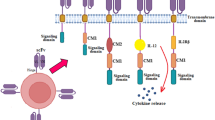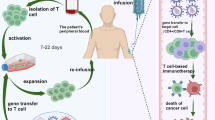Abstract
Minor histocompatibility antigens (mHAgs) are a diverse collection of major histocompatibility complex (MHC)-bound peptides that play a critical role in the induction of detrimental graft-versus-host disease (GVHD) or the development of beneficial graft-versustumor (GVT) effects after allogeneic hematopoietic stem cell transplantation. mHAgs are a consequence of allelic polymorphism that translates to disparity in MHC-presented peptide epitopes between transplant donor and recipient. This donor/recipient allelic disparity can range from infinitesimal amino side chain differences between MHC-presented peptides, to profound structural polymorphisms in genes and proteins that can nullify transcription or translation of one allelic variant and result in the complete aborgation of its presentation by MHC.
Similar content being viewed by others
References
Hinds DA, Stuve LL, Nilsen GB, et al.: Whole-genome patterns of common DNA variation in three human population. Science 2005;307:1072–1079.
Schwab SR, Li KC, Kang C, Shastri N: Constitutive display of cryptic translation products by MHC class I molecules. Science 2003;301:1367–1371.
Horowitz MM, Gale RP, Sondel PM, et al: Graft-versusleukemia reactions after bone marrow transplantation. Blood 1990;75:555–562.
Barrett AJ, Van Rhee F: Graft-versus-leukaemia. Baillieres Clin Haematol 1997;10:337–355.
Weiden PL, Flournoy N, Thomas ED, et al: Antileukenic effect of graft-versus-host disease in human recipients of allogeneic-marrow grafts. N Engl J Med 1979;300:1068–1073.
Bleakley M, Riddell SR: Molecules and mechanisms of the graft-versus-leukaemia effect. Nat Rev Cancer 2004;4:371–380.
Kolb HJ, Schattenberg A, Goldman JM, et al: Graft-versus-leukemia effect of donor lymphocyte transfusions in marrow grafted patients. European Group for Blood and Marrow Transplantation Working Party Chronic Leukemia 1. Blood 1995;86:2041–2050
Slavin S, Naparstek E, Nagler A, Ackerstein A, Kapelushnik J, Or R. Allogeneic cell therapy for relapsed leukemia after bone marrow transplantation with donor peripheral blood lymphocytes. Exp Hematol 1995;23:1553–1562.
Falkenburg JH, Willenze R: Minor histocompatibility antigens as targets of cellular immunotherapy in leukaemia. Best Pract Res Clin Haematol 2004;17:415–425.
Riddell SR, Bleakley M, Nishida T, Berger C, Warren EH. Adoptive transfer of allogeneic antigen-specific T cells. Biol Blood Marrow Transplant 2006;12:9–12.
Ferrara JL, Deeg HJ: Graft-versus-host disease. N Engl J Med 1991;324:667–674.
Chao NJ: Minors come of age: Minor histocompatibility antigens and graft-versus-host disease. Biol Blood Marrow Transplant 2004;10:215–223.
de Bueger M, Bakker A, van Rood JJ, Van der WF, Goulmy E. Tissue distribution of human minor histocompatibility antigens. Ubiquitous versus restricted tissue distribution indicates hetero geneity among human cytotoxic T lymphocyte-defined non-MHC antigens. J Immunol 1992;149:1788–1794.
Warren EH, Greenberg PD, Riddell SR. Cytotoxic T-lymphocyte-defined human minor histocompatibility antigens with a restricted tissue distribution. Blood 1998;91:2197–2207.
den Haan JM, Sherman NE, Blokland E, et al.: Identification of a graft versus host disease-associated human minor histocompatibility antigen. Science 1995;268:1476–1480.
den Haan JM, Meadows LM, Wang W, et al: The minor histocompatibility antigen HA-1: a diallelic gene with a single amino acid polymorphism. Science 1998;279:1054–1057.
Dolstra H, Fredrix H, Maas F, et al: A human minor histocompatibility antigen specific for B cell acute lymphoblastic leukemia. J Exp Med 1999;189:301–308.
de Rijke B, van Horssen-Zoetbrood A, Beekman JM, et al: A frameshift polymorphism in P2X5 elicits an allogeneic cytotoxic T lymphocyte response associated with remission of chronic myeloid leukemia. J Clin Invest 2005;115:3506–3516.
Warren EH, Gavin MA, Simpson E, et al: The human UTY gene encodes a novel HLA-B8-restricted H-Y antigen. I Immunol 2000;164:2807–2814.
Brickner AG, Evans AM, Mito JK, et al: The PANE1 gene encodes a novel human minor histocompatibility antigen that is selectively expressed in B-lymphoid cells and B-CLL. Blood 2006;107:3779–3786.
Akatsuka Y, Nishida T, Kondo E, et al: Identification of a polymorphic gene, BCL2A1, encoding two novel hematopoietic lineage-specific minor histocompatibility antigens. J Exp Med 2003;197:1489–1500
Goulmy E, Human minor histocompatibility antigens: new concepts for marrow transplantation and adoptive immunotherapy. Immunol Rev 1997;157:125–140.
Simpson E, Roopenian D: Minor histocompatibility antigens. Curr Opin Immunol 1997;9:655–661.
Mendoza LM, Paz P, Zuberi A, Christianson G, Roopenian D, Shastri N, Minors held by majors: the H13 minor histocompatibility locus defined as a peptide/MHC class I complex. Immunity 1997;7:461–472.
McBride K, Baron C, Picard S, et al: The model B6(dom1) minor histocompatibility antigen is encoded by a mouse homolog of the yeast STT3 gene. Immunogenet 2002;54:562–569.
Dolstra H, Rijke BB, Fredrix H, et al: Bi-directional allelic recognition of the human minor histocompatibility antigen HB-1 by cytotoxic T lymphocytes. Eur J Immunol 2002;32:2748–2758.
Yadav R, Yoshimura Y, Boesteanu A, et al: The H4b minor histocompatibility antigen is caused by a combination of genetically determined and posttranslational modifications. J Immunol 2003;170:5133–5142.
Roopenian D, Choi EY, Brown A: The immunogenomics of minor histocompatibility antigens. Immunol Rev 2002;190:86–94.
Engelhard VH, Brickner AG, Zarling AL: Insights into antigen processing gained by direct analysis of the naturally processed class I MHC associated peptide repertoire. Mol Immunol 2002;39:127–137.
Malarkannan S, Horng T, Eden P, et al: Differences that matter: major cytotoxic T cell-stimulating minor histocompatibility antigens. Immunity 2000;13:333–344.
Murata M, Warren EH, Riddell SR: A human minor histocompatibility antigen resulting from differential expression due to a gene deletion. J Exp Med 2003;197:1279–1289.
Spierings E, Brickner AG, Caldwell JA, et al: The minor histocompatibility antigen HA-3 arises from differential proteasome-mediated cleavage of the lymphoid blast crisis (Lbc) oncoprotein. Blood 2003;102:621–629.
Brickner AG, Warren EH, Caldwell JA, et al: The immunogenicity of a new human minor histocompatibility antigen results from differential antigen processing. J Exp Med 2001;193:195–206.
Greenfield A, Scott D, Pennisi D, et al: An H-YDb epitope is encoded by a novel mouse Y chromosome gene. Nat Genet 1996;14:474–478.
Mommaas B, Kamp J, Drijfhout JW, et al: Identification of a novel HLA-B60-restricted T cell epitope of the minor histocompatibility antigen HA-1 locus. J Immunol 2002;169:3131–3136.
Schuler MM, Donnes P, Nastke MD, Kohlbacher O, Rammensee HG, Stevanovic S: SNEP: SNP-derived epitope prediction program for minor H antigens. Immunogenet 2005;57:816–820.
Cresswell P: Cell biology. Cutting and pasting antigenic peptides. Science 2004;304:525–527.
Shastri N, Schwab S, Serwold T: Producing nature's gene-chips: the generation of peptides for display by MHC class I molecules. Annu Rev Immunol 2002;20:463–493.
Mendell JT, Dietz HC: When the message goes awry: disease-producing mutations that influence mRNA content and performance. Cell 2001;107:411–414.
Weber JL, David D, Heil J, Fan Y, Zhao C, Marth G: Human diallelic insertion/deletion polymorphisms. Am J Hum Genet 2002;71:854–862.
Warren EH, Otterud BE, Linterman RM, et al: Feasibility of using genetic linkage analysis to identify the genes encoding T cell-defined minor histocompatibility antigens. Tissue Antigens 2002;59:293–303.
Author information
Authors and Affiliations
Corresponding author
Rights and permissions
About this article
Cite this article
Brickner, A.G. Mechanisms of minor histocompatibility antigen immunogenicity. Immunol Res 36, 33–41 (2006). https://doi.org/10.1385/IR:36:1:33
Issue Date:
DOI: https://doi.org/10.1385/IR:36:1:33




